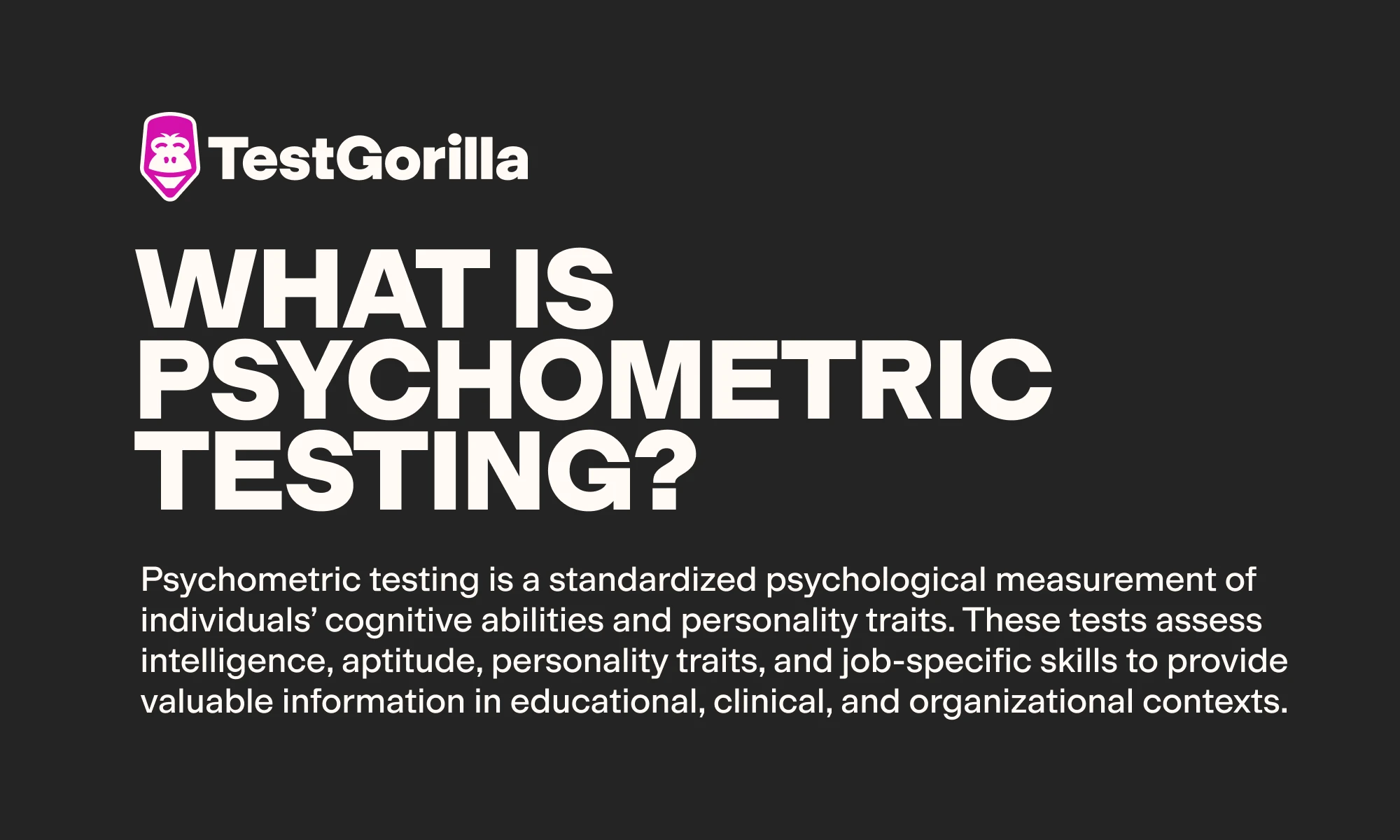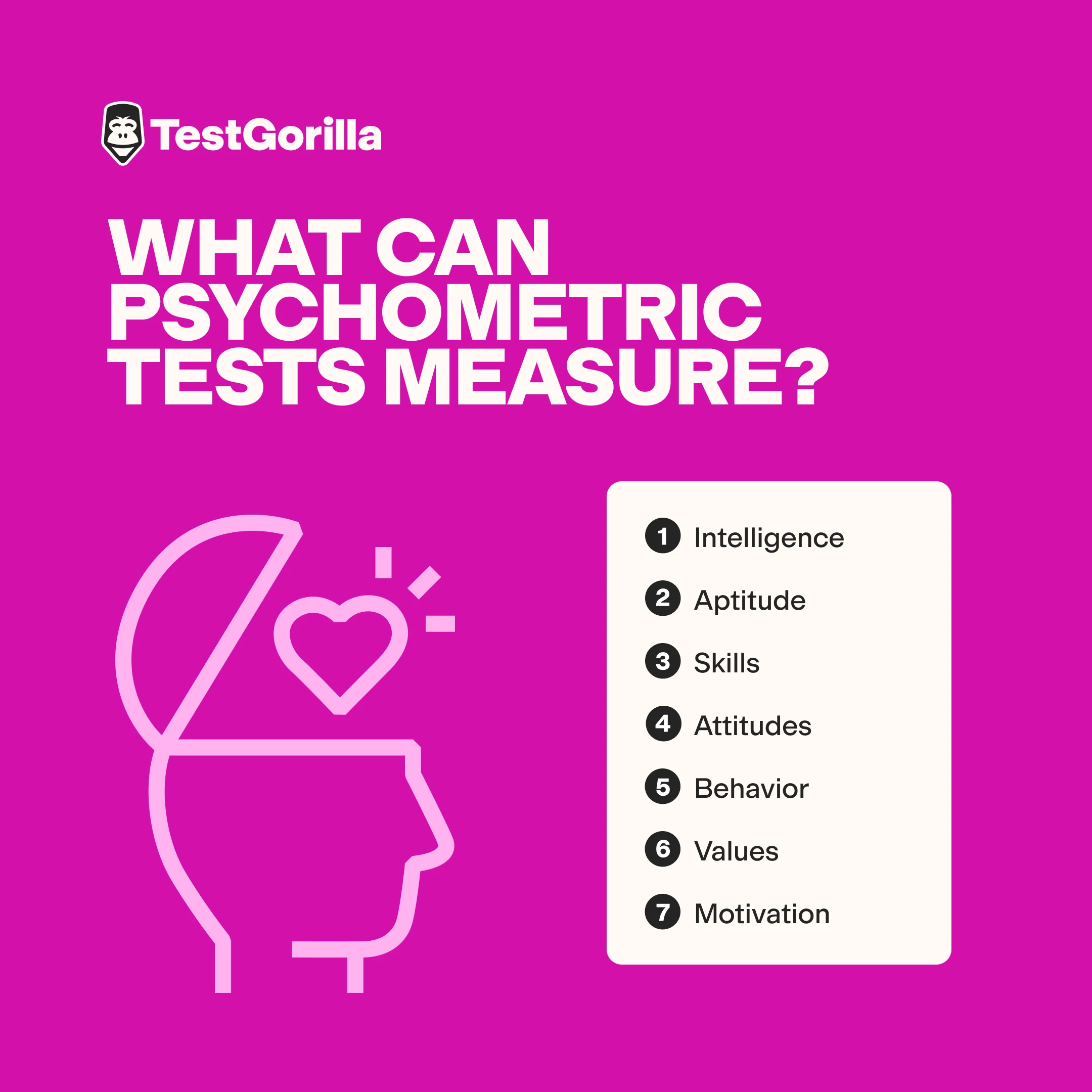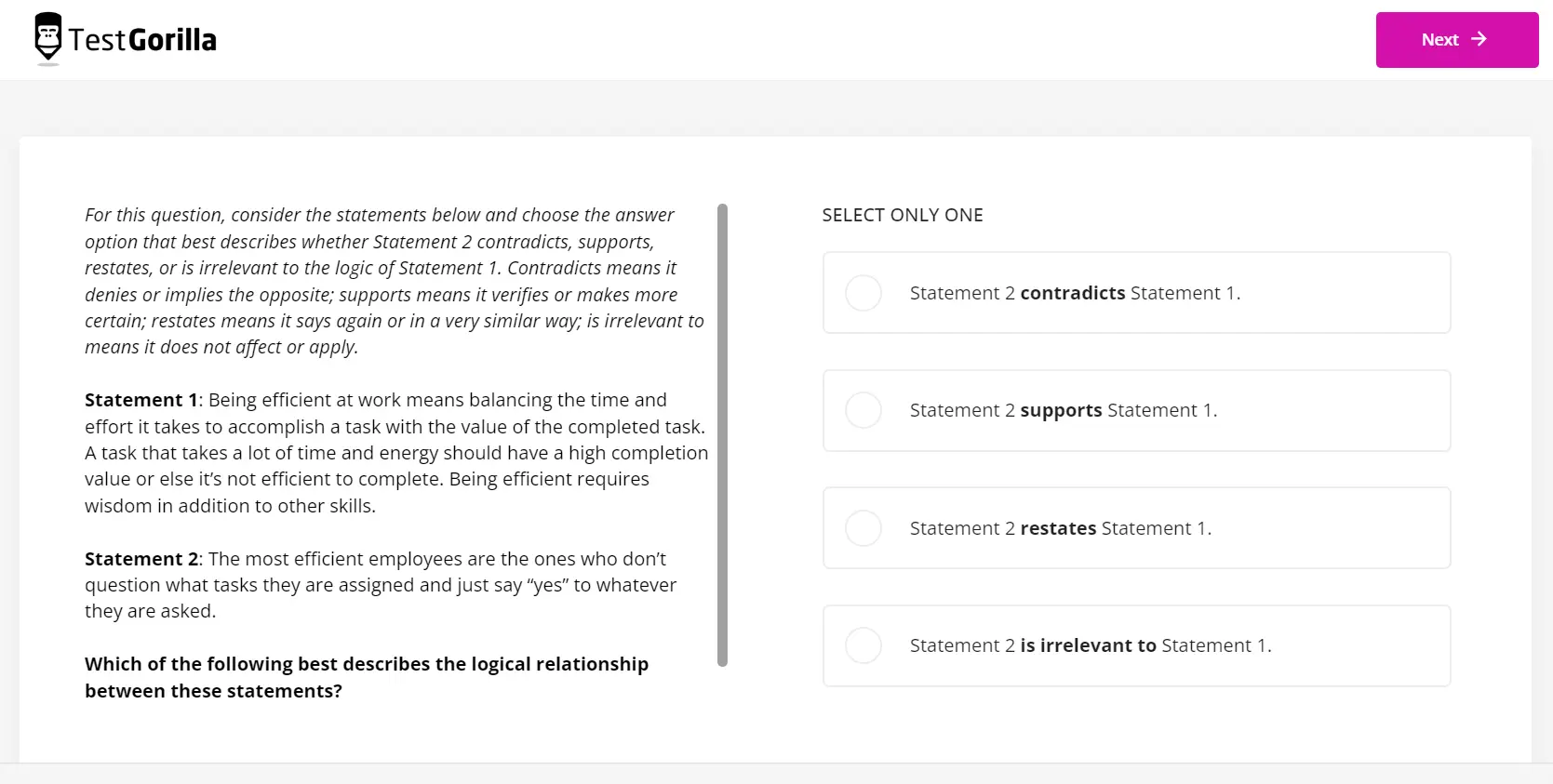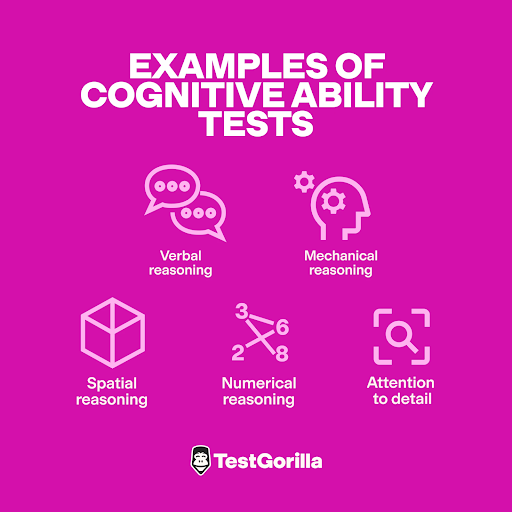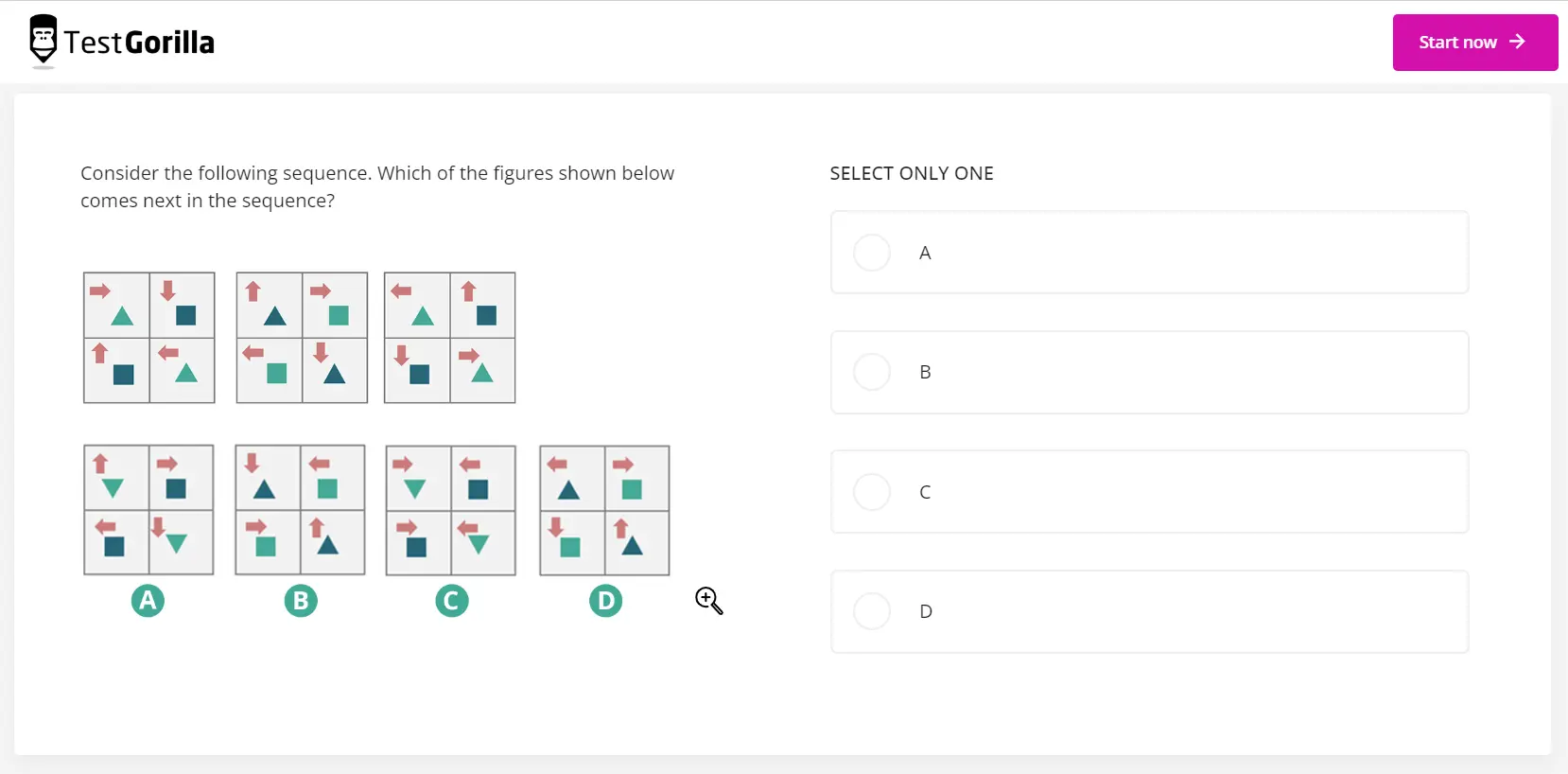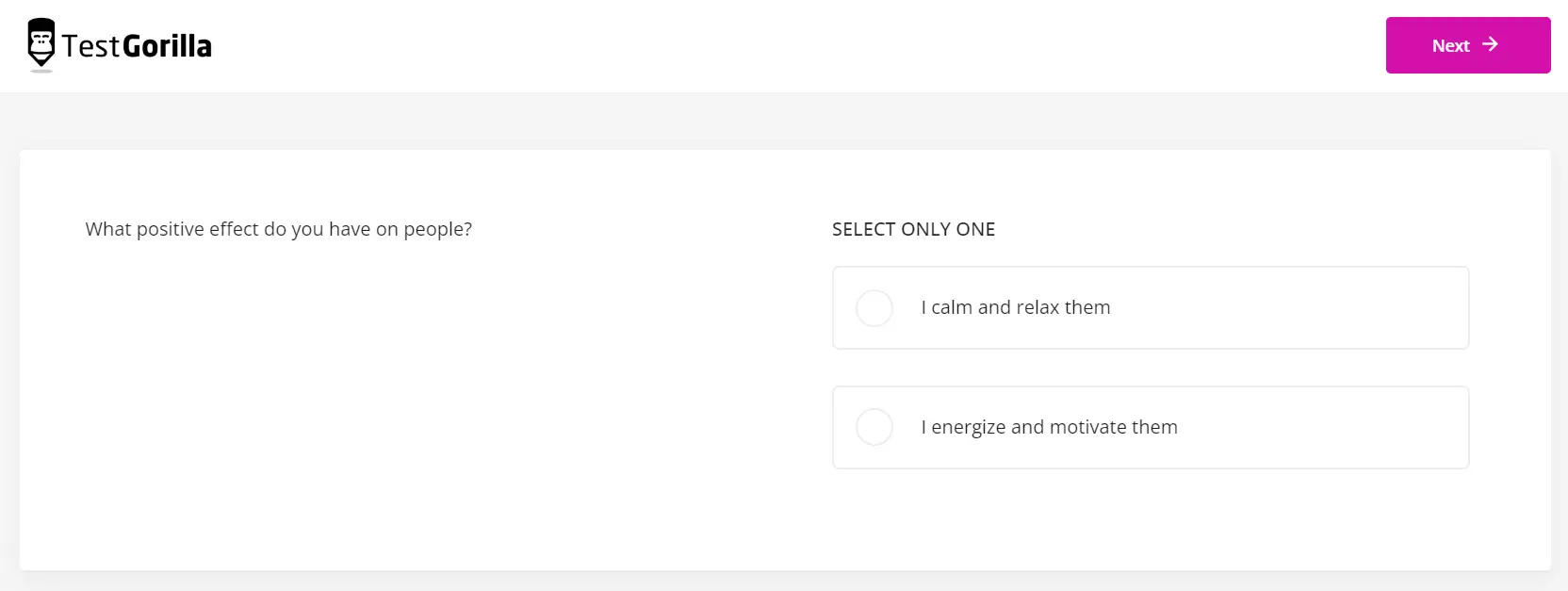Psychometric testing: Complete guide with examples and tips
Find the top candidates with TestGorilla's online skills assessments
Psychometrics – a scientific field focused on testing personality traits and cognitive ability via skill assessments, measurements, and models – makes the difference between an average hire and a great one.
Assessing skills and traits helps you understand the strengths and abilities of your candidates, enabling you to make better hiring decisions.
Still, you must be careful not to rely on a single psychometric test for recruitment because it can give you an incomplete picture of a candidate’s abilities.
In this article, we examine different types of psychometric testing, provide psychometric assessment examples, and give you tips on how to use them to find the best talent.
Table of contents
- What is psychometric testing?
- What can psychometric tests measure?
- Different types of psychometric testing
- Advantages of psychometric tests
- Psychometric assessment examples
- How to use psychometric testing to improve hiring
- Use TestGorilla’s psychometric tests to hire better talent
- Psychometric testing assessments FAQs
What is psychometric testing?
Psychometric testing is a standardized psychological measurement of individuals’ cognitive abilities and personality traits. These tests assess intelligence, aptitude, personality traits, and job-specific skills to provide valuable information in educational, clinical, and organizational contexts.
This method is perfect for evaluating skill sets and abilities you can’t measure in an interview, a cover letter, or a resume. One good example is employee integrity testing.
Hiring managers use a psychometric test for recruitment to:
Evaluate strengths and weaknesses
Complete candidates’ profiles with more data
Compare applicants
Assess culture add
Reduce biases and hire a diverse workforce
Determine suitability for internal mobility opportunities
Psychometric tests are also popular in career planning and personal development because they help match human resources with suitable career paths.
What can psychometric tests measure?
Now that we understand what a psychometric test is in recruitment, let’s see what it can measure.
Psychometric testing assessments can measure various skills, aptitudes, and traits.
What psychometric testing measures | Psychometrics examples |
Intelligence | Measures cognitive intelligence skills like logical reasoning, spatial thinking, mechanical reasoning, emotional and social intelligence, and problem-solving |
Aptitude | Evaluates the ability to learn new skills and understand instructions |
Skills | Assesses specific job, experience, or knowledge-related competencies or soft skills, such as network engineering, design thinking, or communication |
Attitudes | Evaluates attitudes towards other people, new and unfamiliar situations, or challenges |
Behavior | Measures and predicts behavior in specific circumstances, especially work-related situations |
Values | Examines a person’s attitude and behavior, helping assess their cultural add |
Motivation | Identify different motivators closely related to work and a candidate’s willingness and ability to excel |
In addition, in the medical context, trained professionals rely on psychometric psychology and testing to assess an individual’s mental health status.
Discover our full range of online psychometric tests
Book a free live demo with us and unlock the potential of skills-based hiring.
Different types of psychometric testing
Different types of psychometric testing evaluate everything from cognitive abilities to complex personality traits, providing valuable insights for more informed hiring decisions.
In general, psychometrics tests fall into two major categories:
Cognitive ability tests
Personality tests
Other types of tests psychometricians use are:
Numerical tests
Aptitude tests
Practice tests
Myers-Briggs Type Indicator (MBTI) tests
Free practice tests
Personality assessments
Situational judgement tests
Let’s take a quick look at psychometrics examples.
Cognitive ability tests
Cognitive ability tests evaluate specific cognitive thinking skills and abilities to help you find the perfect candidate for a position. That’s important because general mental ability is a great predictor of job performance.
You can use cognitive ability tests to measure:
Cognitive intelligence: Different tests measure various forms of intelligence, such as reading comprehension, critical thinking, and numerical reasoning
Aptitude and skills: Assessments can evaluate soft skills like communication skills and time management or job-specific skills, such as negotiation, working with data, and accounting
The IQ test is one of the most common psychometric assessment examples of cognitive ability. Many different IQ tests exist, but the Wechsler Adult Intelligence Scale is one of the most popular options.
However, companies no longer use IQ tests in recruitment because test results can promote cultural bias. IQ assessments can put candidates from different cultural backgrounds at a disadvantage because their knowledge and experiences don’t align with the test’s content.
This discrepancy can lead to unfairly low scores that don’t accurately reflect potential cognitive abilities. Instead, recruiters prefer other cognitive ability tests, such as our Critical Thinking test.
For more practice questions from this test, check out the Critical Thinking test preview.
Personality tests
Personality questionnaires and tests are a great way to get to know more about your candidates because they give you insights about:
Personality type, attitudes, and behavior: Help you understand how applicants behave in specific circumstances, especially new and unfamiliar situations
Values: Measure unique traits of a personality profile, such as honesty and integrity, which direct a person’s behavior
Motivation: Identify the best ways to motivate a specific candidate, such as public praise and recognition in the workplace
You shouldn’t use personality tests as a standalone assessment tool because they don’t give you a comprehensive evaluation of a candidate’s skills. Instead, they should be a part of a carefully defined strategy that considers company culture, team cohesion, and diversity.
These assessments can predict job performance to an extent, but when combined with other skill tests, they give you a complete view of a candidate’s potential.
For example, you can use our Culture Add test to measure if candidates’ values and behaviors match your company’s core values.
That way, each new team member contributes positively to the company culture, which is important for decision-making, innovation, and employee engagement.
Advantages of psychometric tests
Psychometric testing assessments have several advantages for improving the hiring process and candidate experience.
Benefits of psychometric testing | How they help |
1. Support data-driven hiring decisions | Psychometrics tests help you get a complete picture of each candidate’s skills and abilities. |
2. Quickly filter out candidates | If you administer the proper tests, you can instantly see whether someone has the right cognitive abilities and personality traits for a role. It helps you reduce the time to hire and cost-per-hire. Considering that the average time to hire is 44 days, it’s important to be more efficient. |
3. Provide a clear overview of each candidate | You get in-depth, detailed information on each applicant’s performance potential, cognitive abilities, and personality. This way, you can analyze each applicant’s profile to see how someone aligns with a job. |
4. Help measure things you couldn’t otherwise detect | Cognitive ability and personality are difficult to measure from a resume or cover letter. With the right set of tests, you can evaluate each applicant’s unique skills. |
4. Compare many candidates at a glance | You can analyze multiple profiles at once and compare them. Psychometric testing takes less time than interviews, which helps you see how everyone scores for various skills to identify the best candidates. |
5. Promote diversity and inclusivity | By using various types of psychometric assessments, you don’t have to rely on your gut feeling for decisions. It helps you reduce biases in hiring, objectively assess candidates, and hire a more diverse workforce. |
Now that we’ve established how these tests support the hiring process, let’s explore some psychometrics examples.
Psychometric assessment examples
At TestGorilla, we partner with psychologists and subject matter experts to create online psychometric tests you can use in your hiring process to find the best candidates. Most tests take around 10-15 minutes to complete and contain multiple-choice questions.
We evaluate each test to ensure it has all the right psychometric properties, paying special attention to validity and reliability. The result is our extensive test library of psychometric testing examples you can combine in a comprehensive five-test assessment.
Companies can customize each assessment to evaluate the most important skills for the role. For example, Ocean Outdoor UK, a digital advertising company, used our Attention to Detail test with other role-specific skills tests.
As a result, the company was able to streamline the screening of candidates, focusing more on those who showed the necessary skills for the role. This strategic use of psychometric testing enabled the organization to shorten the lengthy selection process and reduce mis-hires by 44%.
Let’s explore some psychometric testing examples you can use in your hiring process, along with the roles for which those tests could be relevant.
Cognitive ability assessments
Cognitive ability tests reliably predict a candidate’s problem-solving skills and ability to learn new tasks quickly. These assessments help identify individuals who are likely to excel in intellectually demanding roles.
Here are some of our psychometric testing examples for cognitive ability:
The Verbal Reasoning test helps you measure candidates’ capacity to draw accurate conclusions from text and evaluate relationships between words and phrases. It can be used to hire people in many fields, including law, marketing, sales, journalism, and consulting.
The Mechanical Reasoning test assesses candidates’ familiarity with fundamental concepts of physics and mechanics, such as force, movement, and velocity. This psychometric test example can help you hire for blue-collar jobs, such as HVAC technicians, equipment installation technicians, maintenance mechanics, and machine operators. You can also use it to hire engineers or technical salespersons.
The Spatial Reasoning test covers skills such as mental rotation, spatial visualization, mental folding, and spatial working memory. These skills are important for engineering roles or STEM jobs.
The Numerical Reasoning test evaluates applicants’ abilities to interpret numbers, percentages, and fractions, understand numerical patterns, and analyze text, tables, charts, and graphs. Strong numerical reasoning skills are crucial for accounting, auditing, finance, and technical roles like software engineers and data analysts.
The Attention to Detail (Visual) test assesses applicants’ ability to pay close attention to visual information, cues, and details. You can use this test to hire graphic or web designers, lab technicians, or data analysts.
Unlock the power of cognitive skills testing with TestGorilla
Our cognitive ability tests can help you find candidates who can think critically to overcome challenges and find effective solutions. Creating a TestGorilla assessment is quick and easy.
Personality tests
Here are some of the online psychometric test examples you can find in our test library:
The DISC test helps you understand how your applicants express emotions based on four behavior types: dominance (D), influence (I), steadiness (S), and conscientiousness (C). You can use this psychometric test example to hire for any position, better understand employees, and improve team dynamics.
The Big 5 (OCEAN) test evaluates five important dimensions of candidates’ personalities: extraversion, openness, conscientiousness, agreeableness, and emotional stability. Insights from this test can help you understand each applicant better, enabling a better hiring decision.
16 Personalities test analyzes applicants’ cognitive style, decision-making process, motivations, and lifestyle preferences. You can use it to understand how your candidates navigate issues and challenges in general, which helps predict how they handle stress and conflict in the workplace.
Want to see more questions from our 16 Personalities test? Check out the 16 Personalities test preview.
How to use psychometric testing to improve hiring
Although psychometric testing offers valuable insights into a candidate’s potential, it’s most effective as part of a multi-step, data-driven strategy.
For example, even if someone is highly conscientious, extroverted, and creative, this doesn’t necessarily mean they’d qualify for a role.
However, you can get a solid understanding of someone’s capacities, which you can use to prepare for a structured interview or provide other talent assessments.
That’s why the best approach is to use various types of assessments, including job-related skills tests and structured interviews, to get a comprehensive picture of each candidate.
A good hiring process is also vital for improving the candidate experience because 76% of applicants state that a positive experience affects their decision to accept an offer.
You can use psychometric testing to improve your hiring process through the following steps:
Establish which skills and abilities are most important for the job
Find online psychometric tests that accurately evaluate these skills
Use a platform that has a combination of testing methods, including psychometric tests, to get a well-rounded view of candidates
Provide clear instructions on how to take these assessments
Give candidates sufficient time to complete the tests
Compare candidates’ results with your existing employees and industry peers to get a better understanding of their abilities
Carefully review the results of the tests and use them to eliminate candidates who don’t meet your requirements
Pick the top-performing candidates and interview the best ones
Use TestGorilla’s psychometric tests to hire better talent
Psychometric testing is great for building a data-driven recruitment process that supports better hiring decisions. This approach helps you minimize biases, hire an inclusive workforce, and concentrate on what matters – finding someone with the right skills.
At TestGorilla, we collaborate with industry specialists to develop various psychometric tests that accurately assess different skills and traits. We constantly improve the quality of our tests by taking into consideration the candidate’s experience and feedback.
Take the product tour to get a quick rundown on how our talent assessments work and what makes them unique.
You can also schedule a live demo to dive deeper into the specifics and learn how to use TalentGorilla in your specific hiring process.
Or sign up for a free forever plan and start using our skills assessments today!
Psychometric testing assessments FAQs
If you still have questions about psychometrics tests, explore this section to learn more.
Are psychometric tests accurate?
Yes, psychometric tests are accurate when designed by subject matter experts and reviewed by qualified professionals. That includes proper administration, using correct tests to measure desired skills, and providing applicants with enough context. A psychometric test for recruitment can’t predict job performance with a 100% success rate, but when combined with other assessment methods, such as structured interviews, it helps you make better hiring decisions.
Are game-based tests similar to psychometric tests?
Game-based tests are a type of psychometric tests that use interactive tasks, puzzles, and game-like elements to assess candidates’ skills and traits. They offer a user-friendly way to evaluate key competencies, improving candidate experience and potentially reducing test anxiety. However, they are new in the hiring world, so some candidates perceive them as less desirable than traditional psychometric tests.
Can personality tests predict job performance?
Personality tests can’t directly predict job performance. However, they provide valuable insights into how a person’s traits align with job requirements and workplace culture, which influence job performance. These tests and questionnaires offer a nuanced view of a candidate’s tendencies, motivations, and work style, which helps you get a complete assessment with other skills and cognitive testing. According to research, conscientiousness is a personality trait that most accurately predicts job success.
What type of questions are asked in psychometric tests?
Logical reasoning: Puzzles and sequences to evaluate analytical and critical thinking
Verbal reasoning: Text interpretations for assessing language comprehension and communication
Numerical reasoning: Math problems and graphs to test quantitative skills and data interpretation
Personality inventories: Statements on behavior and preferences to uncover personality traits
Situational judgments: Work-related scenarios that require a choice of action to measure practical decision-making
Abstract reasoning: Identifying patterns to assess conceptual and strategic thinking abilities
What are the disadvantages of psychological testing?
The main disadvantage of psychological testing is that it can’t cover the full complexity of human behavior, potentially overlooking nuanced traits and adaptabilities. In addition, candidates can tailor their responses to align with perceived desirable attributes, which can skew results. Lastly, over-reliance on psychometric testing outcomes can overshadow other critical, qualitative evaluations in understanding an individual’s capabilities and potential.
Related posts
Hire the best candidates with TestGorilla
Create pre-employment assessments in minutes to screen candidates, save time, and hire the best talent.
Latest posts
The best advice in pre-employment testing, in your inbox.
No spam. Unsubscribe at any time.

Hire the best. No bias. No stress.
Our screening tests identify the best candidates and make your hiring decisions faster, easier, and bias-free.
Free resources
This checklist covers key features you should look for when choosing a skills testing platform
This resource will help you develop an onboarding checklist for new hires.
How to assess your candidates' attention to detail.
Learn how to get human resources certified through HRCI or SHRM.
Learn how you can improve the level of talent at your company.
Learn how CapitalT reduced hiring bias with online skills assessments.
Learn how to make the resume process more efficient and more effective.
Improve your hiring strategy with these 7 critical recruitment metrics.
Learn how Sukhi decreased time spent reviewing resumes by 83%!
Hire more efficiently with these hacks that 99% of recruiters aren't using.
Make a business case for diversity and inclusion initiatives with this data.

